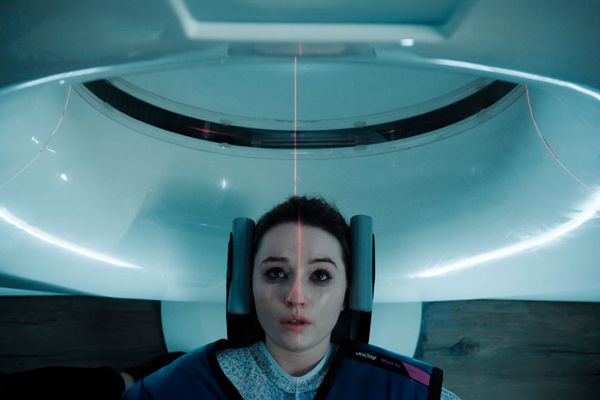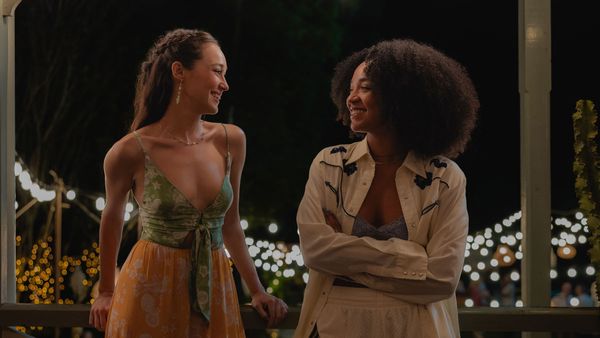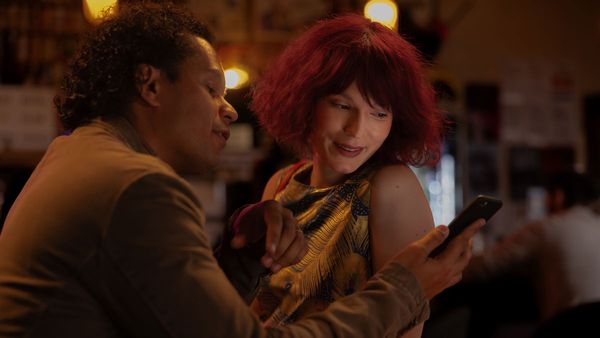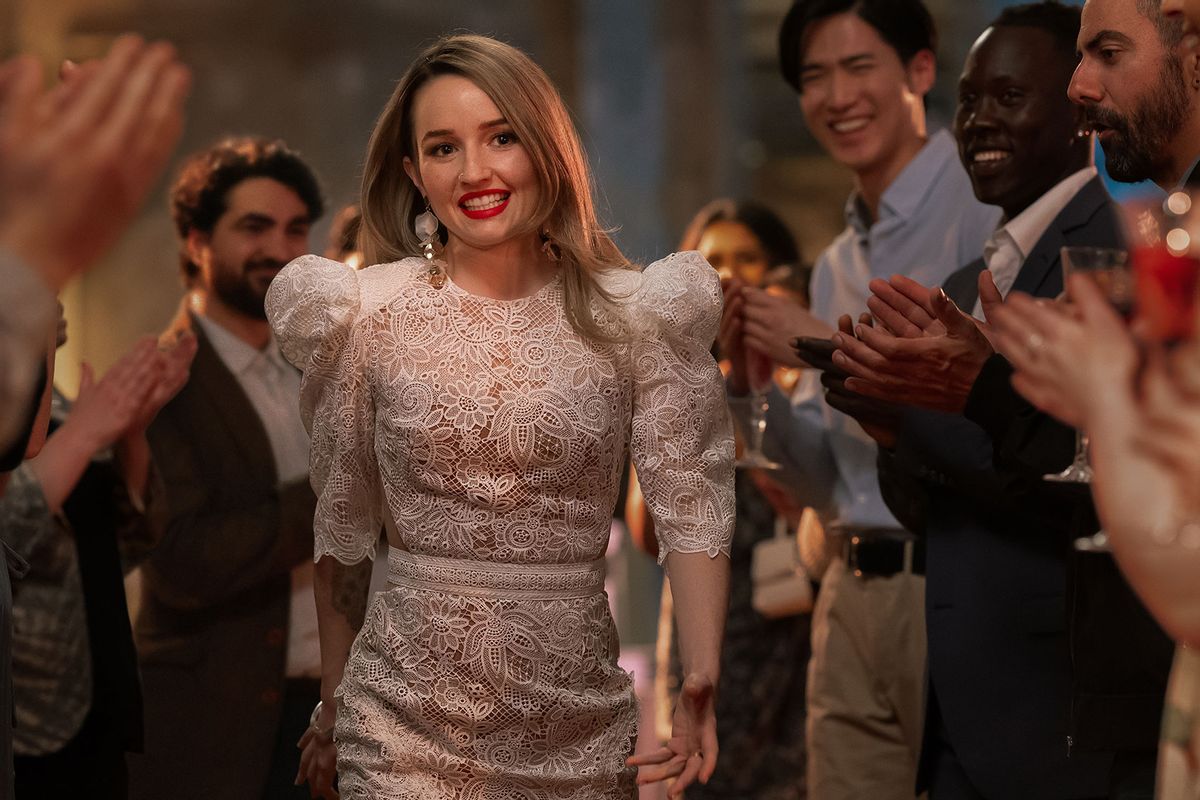We may never hit peak true crime, but when we struggle to tell one TV series’ fraudster apart from another, we may have reached white girl scammer saturation. To wit: three entirely unrelated people I know mistook Kaitlyn Dever, the star of “Apple Cider Vinegar,” for the actor who played Anna Delvey.
“Inventing Anna” star Julia Garner and Dever look nothing alike; also, anecdotes are sloppy, unreliable data. Still, you can see it, right? That’s no fault of Dever's but rather, a matter of the mind’s eye making twins of Delvey and Australian wellness fraudster Belle Gibson, whose story inspired “Apple Cider Vinegar.” Or triplets, maybe, once you throw in Elizabeth Holmes.
They are of a kind — charismatic golden girls who talk their way into expert status in areas that require extensive training, education and research experience. Once their lies are exposed, we see their real proficiency is in deflecting accountability, wilting tragically under pressure, or squeezing out rivers of tears to buy sympathy.
A show like “Apple Cider Vinegar,” based on “The Woman Who Fooled the World,” by the journalists who eventually punctured Gibson’s illusion, gives us a close-up of how this particular flavor of con artist kombucha was brewed.
The show is a work of fiction, a different character reminds us as each episode begins. If its creator Samantha Strauss took a few liberties with Gibson’s story, so what? Gibson fooled people into believing she had cancer when she didn’t.
 Kaitlyn Dever in "Apple Cider Vinegar" (Courtesy of Netflix)
Kaitlyn Dever in "Apple Cider Vinegar" (Courtesy of Netflix)
What she had, the series posits, was a yearning for validation and a marketable app concept. “The Whole Pantry” preached diet as a cornerstone of health, including the power to manage her non-existent brain tumor. It shot to the top of Apple’s popular downloads list, netting her a cookbook deal, Insta-celebrity, and an eventual stunning downfall.
Don’t blame the player, blame the scams. Many offer something we’re craving or claim to have the solution to an unmet need. What if a drop of blood could be accurately tested to diagnose an array of maladies? What if an incurable condition could be managed with fresh juice and coffee enemas?
Dever’s Gibson is one of the few characters in "Apple Cider Vinegar” series going by the actual name of the person their character is based on. Aisha Dee‘s Chanelle is another, or at least she shares many traits with another figure from Gibson’s life, her ex-friend Chanelle McAuliffe, who eventually shared what she knew with The Age, the Australian newspaper that broke the story that exposed Gibson’s fakery.
But Milla Blake (Alycia Debnam-Carey) is reportedly an amalgam of wellness influencers, although her history bears many similarities to that of Australian blogger and “Wellness Warrior” Jessica Ainscough, Gibson’s contemporary.
“Apple Cider Vinegar” hammers across – subconsciously, granted — the notion of shared culpability between the medical profession and snake oil wellness peddlers.
Like Milla, Ainscough was diagnosed with an aggressive type of epithelioid sarcoma in her forearm. Milla’s doctors prescribe amputation, but she voices her determination to try alternative methods instead – she did her own research, you know. Her findings take her to a Mexican wellness resort based on an actual ineffective protocol called Gerson Therapy.
Milla’s perceived success with that treatment, combined with her conventional attractiveness, makes her an Internet celebrity. Dever’s Bell tries to hitch herself to Milla, and when she’s rebuffed, borrows Milla’s tragedy to whip up a false story about battling brain cancer. Faking a health crisis was a genius marketing strategy, winning her around 200,000 Instagram followers – an impressive count in the platform’s earliest days.
 Alycia Debnam-Carey and Aisha Dee in "Apple Cider Vinegar" (Courtesy of Netflix)
Alycia Debnam-Carey and Aisha Dee in "Apple Cider Vinegar" (Courtesy of Netflix)
Guess where this map leads. Milla’s evangelism brings her true believers and an income, but she's also honest with her fans when her cancer aggressively returns and her diagnosis is terminal. Belle, though, becomes such a presence that when her followers who are legitimately battling cancer begin to question her story’s validity it all unravels in 2015.
That’s where the moral of the story kicks in. For five of its six episodes “Apple Cider Vinegar” hammers across – subconsciously, granted — the notion of shared culpability between the medical profession and snake oil wellness peddlers. We aren’t shown a single doctor with a sympathetic bedside manner. (Curiously, it’s a female nurse who hops right to selling a wacky supplement to a character while they’re holding their stillborn baby.)
Maybe, then, we can understand how the Millas of the world came to flourish. In one scene, she faces a table of medical professionals and has to demand that her oncologist look at her, not her father, while discussing her health. He condescendingly calls her “young lady” while attempting to impress on her the seriousness of her mortality risk. When she consents to a localized chemotherapy treatment, the doctor turns narrator and shares that, for Milla’s type of cancer, amputation would have given her a survival rate of close to 90%, whereas the three-month response rate to her type of cancer hovered around 37%.
“[B]ut I’m not an attractive young woman,” he shares, “and it’s not my arm.”
 Mark Coles Smith and Tilda Cobham-Hervey in "Apple Cider Vinegar" (Courtesy of Netflix)
Mark Coles Smith and Tilda Cobham-Hervey in "Apple Cider Vinegar" (Courtesy of Netflix)
Every trained physician is about as pleasant, including the cancer specialist attending Lucy (Tilda Cobham-Hervey), a breast cancer patient who falls under Belle’s spell. Her husband Justin (Mark Coles Smith), a journalist for The Age, correctly suspects that Belle is a fraud but is mainly acting from a concern about his wife pausing drastic but vital therapies to place her trust in The Whole Pantry app and its beetroot burgers. But Lucy’s scowling doctor doesn’t help Justin’s case when he pleads with her.
Granted, it is not a doctor's job to entertain their gravely ill patients into following their advice. Doctors have a right to be ticked off at influencers giving dangerous health advice they aren't qualified to dole out. If Milla's oncologist seethes at having his medical advice pushed aside so she can try "mistletoe therapy" (!) he's entitled to it.
But this willful belief in a smiling, sunny lie leads vulnerable people to embrace that mirage rather than face facts they need to swallow but won't enjoy tasting. Once Justin and his colleague finally publish their scoop, they’re attacked by Belle’s followers, who choose to believe her instead of considering that their angel of love and light, kiss-kiss, might be lying to them. This being fiction, the online tide turns in a matter of hours. About-faces rarely occur as quickly in reality.
We need your help to stay independent
Embracing a pretty deception is much easier. Strauss, who also adapted “Nine Perfect Strangers,” transforms Gibson's story into a fast-paced, funny and illuminative parable that, in its unique way, explains how fringe disinformation became our reality, and how the ludicrous became plausible.
Each episode opens with actors, in character, reciting as much of the production’s very real legal, C.Y.A. boilerplate as they choose. The part they don’t mess around with is an assurance that Gibson hasn’t been paid for her story.
If we were to put a face to the nation’s mass abandonment of science and reason, it would be Kennedy’s, not Gwyneth Paltrow’s.
Watching a talent like Dever (who people may recognize from "Dopesick") play someone like Gibson grants some insight into the psychology of these monstrous Tinkerbells. We shouldn’t discount the venal draw of a show like this, which is that plenty of Gibson’s followers probably still believe in her, although they might not admit it openly. After all, wasn’t some of what she said true? Not the cancer part, or the charity bilking, but if the recipes weren’t good, the app wouldn’t have been such a hit, right?
Take a wider lens to that and you can understand why women claiming to be health obsessives comprise the backbone of Robert F. Kennedy Jr.’s public support for his bid to run the Department of Health and Human Services.
Kennedy has no medical expertise and peddled a range of harmful quackery as a private citizen, including anti-vaccination rhetoric and the benefits of chugging raw milk. Strauss named “Apple Cider Vinegar” after the wellness industry’s compulsion to tout solutions in bottles of everyday consumables the medical industry “doesn’t want you to know about.” If we were to put a face to the nation’s mass abandonment of science and reason, it would be Kennedy’s, not Gwyneth Paltrow’s.
The resilience of these “based on a true story” series remains intact because so many of these fraudsters resemble the “Goop” founder, and got away with playing dress-up as part of the 1%. Gibson is not Gwyneth but, bless her heart, she was trying to be.
How convincingly Dever plays Gibson, then, is secondary. (Not for nothing, but she does a stunning job down to her spot-on Aussie accent.) What matters more is the series’ effectiveness in revealing why we’re so vulnerable to scams when life feels increasingly out of control.
Want a daily wrap-up of all the news and commentary Salon has to offer? Subscribe to our morning newsletter, Crash Course.
What would sour-faced doctors and scientists proclaiming what must and can’t be done know about our bodies and our intuition? Why should we trust experts with decades of training and research experience to look out for our health when a man with a famous name and no medical training knows how to do a better job? That’s what we’re assuming because he said he could.
In the middle of Episode 3’s opening recitation of “This is a true-ish story based on a lie,” Phoenix Raei, the actor playing Hek, a PR crisis manager, starts to rattle off, “Some names have been changed and characters invented which is…” before halting to stare through the fourth wall instead of just talking to it.
“Do you care? Should you?” Then Hek recites all the weak points in our logical firewalls that allow conspiracies and swindles to find purchase: Fake news. Post-truth. Our arrogance, “where we f**k facts and cherry-pick what science we want to believe in,” he says.
He continues rattling off his nihilistic list until he lands on the reason for this drug-fueled rant. “We’ve become incapable of objective thought,” he concludes.
Not many will come away from “Apple Cider Vinegar” with the impression that this is its point. But if we stab to the truth of it, most won’t care. It’s a crazy tale we’ve enjoyed before and will see again in some form, including in the real world and in real time. The scam is too good to let go.
"Apple Cider Vinegar" is streaming on Netflix.



Shares